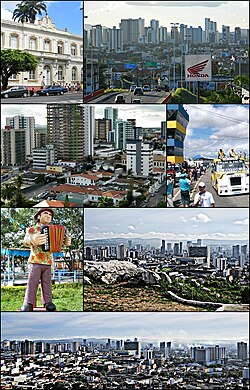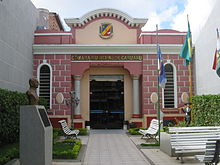Caruaru
Caruaru
Município de Caruaru | |
|---|---|
Municipality | |
| Municipality of Caruaru | |
 | |
| Country | |
| Region | Northeast |
| State | |
| Founded | 1849 |
| Government | |
| • Mayor | José Queiroz (PDT) |
| Area | |
| • Total | 920.61 km2 (355.45 sq mi) |
| Elevation | 545 m (1,788 ft) |
| Population (2010) | |
| • Total | 354,951 |
| • Density | 324.2/km2 (840/sq mi) |
| Time zone | UTC-3 (UTC−3) |
| • Summer (DST) | UTC-3 (UTC−3) |
| Postal code | 55000-000 |
| Area code | +55 81 |
| HDI (2000) | 0.713 – medium |
| Website | www |
Caruaru is a Brazilian municipality in the state of Pernambuco. The most populous city in the interior of the state, Caruaru is located in the microzone of Agreste and because of its cultural importance, it is nicknamed Capital do Agreste (Portuguese for the "capital city of the Agreste region"), Princesinha do Agreste ("Little Princess of Agreste"), and Capital do Forró ("the capital city of forró").
The city is located 140 kilometers (87 miles) from the state capital of Recife, which has an international airport. Caruaru is renowned for its extensive Festival de São João ("Saint John's Festival"), which takes up the whole month of June, sometimes extending into July. Caruaru had a 2010 resident population of 354,951 inhabitants, living in a land area of 920.61 square kilometers (355.45 square miles).
Caruaru is the hometown, among others, of Álvaro Lins, Brazilian journalist, and Lieutenant Brigadier Reginaldo dos Santos, former dean of the Brazilian Technological Institute for Aeronautics.
History

The lands that today comprise the city of Caruaru were originally a cattle ranch owned by family Nunes dos Bezerros. This name was given because of the proximity of the farm to the Bezerros chapel. Some orphans used to live with the Nunes family. One of them, José Rodrigues de Jesus, inherited part of the estate, staying at the location that would later be named Caruaru. There he built a chapel dedicated to the Immaculate Conception. A village started to grow around this chapel. In 1846, Friar Euzébio de Sales started to build the parish named Igreja Matriz, nowadays a cathedral. In later years, the church was rebuilt twice, the last one in 1883. The geographical position benefited the city, because it was a necessary stopover in the transportation of cattle to the interior of the state.
Geography

- State: Pernambuco
- Region: Agreste of Pernambuco
- Bordering municipalities: Toritama, Vertentes, Frei Miguelinho and Taquaritinga do Norte (N); Altinho and Agrestina (S); Brejo da Madre de Deus and São Caetano (W); Bezerros and Riacho das Almas (E)
- Area: 920.61 km2 (355.45 square miles)
- Elevation: 554 m (1,818 ft)
- Hydrography: Capibaribe, Ipojuca and Una rivers
- Vegetation: Hypoxerophilous Caatinga
- Climate: Semi-arid
- Mean annual temperature: 23.5 °C (74.3 °F)
- Main road: BR-232
- Distance to Recife - 140 km
- Distance to Gravatá - 48 km
Economy
The main economic activities in Caruaru are industry (especially textiles), tourism, commerce, and handicraft, and the primary sector, especially the raising of goats, chickens, and cattle, and the production of milk. Agricultural activity in the Caruaru area also includes beans, cassava, and corn. Caruaru also hosts one of the biggest open-air traditional handicrafts markets of Brazil, the Feira de Caruaru.
Economic Indicators

| Population[1] | GDP x(1000 R$).[2] | GDP pc (R$) | PE |
|---|---|---|---|
| 319 579 | 1.993.295 | 6.895 | 3.24% |
| Primary sector | Secondary sector | Service sector |
|---|---|---|
| 1.01% | 14.40% | 84.59% |
Health Indicators
| HDI (2000)[3] | Hospitals (2007) | Hospitals beds (2007) | Children's Mortality every 1000 (2005) |
|---|---|---|---|
| 0.713 | 11 | 654 | 8.2 |
Sports

There are two association football (soccer) teams in the city: Clube Atlético do Porto, which plays at Antônio Inácio de Souza Stadium (capacity: 6,000), and Central Sport Club, which plays at Estádio Luiz José de Lacerda (capacity: 20,000). Both teams compete in the main series of Pernambuco's state tournament. Caruaru also hosts an annual race of the Brazilian Formula Truck competition, at the Ayrton Senna International Circuit, the state's main motor race track.
Tourism
- Video: Saint John's Festival in Caruaru
- Video: Caruaru's traditional handicraft market
- Video: Caruaru's Formula Truck race
References
- ^ http://www.ibge.gov.br/home/estatistica/populacao/estimativa2009/POP2009_DOU.pdf IBGE Population 2009 Caruaru, page 32
- ^ Caruaru 2007 GDP IBGE page 29
- ^ PE State site - City by city profile

